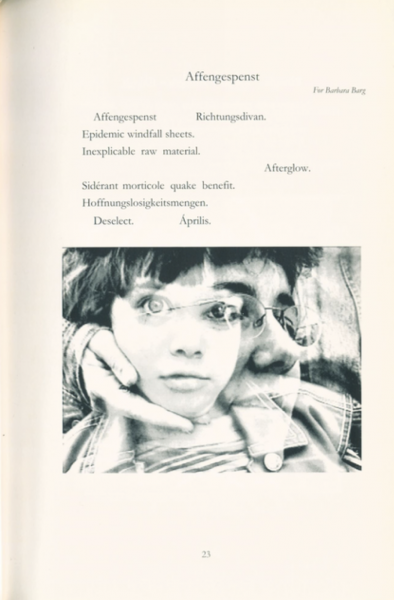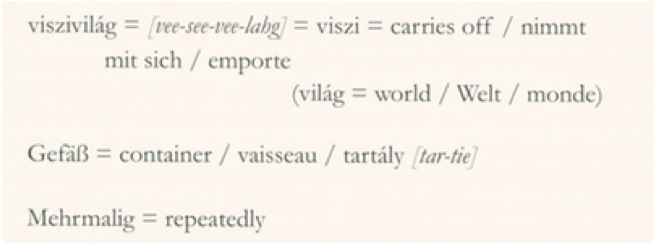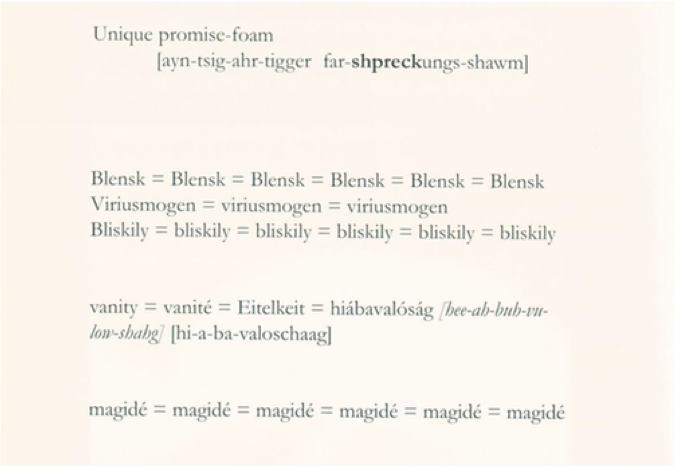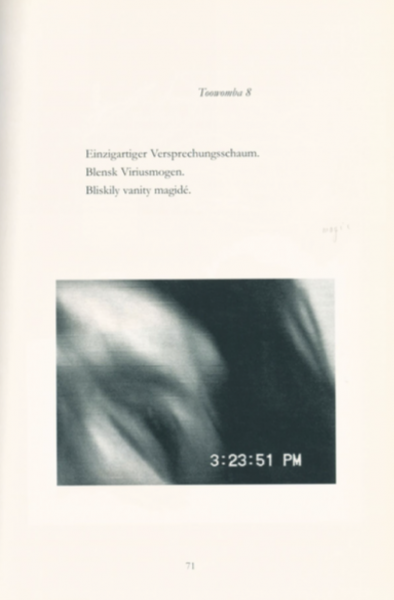Anne Tardos in high definition
Polylingualism and extremity in 'Uxudo'
![“[B]alancing the affordances, entailments, and opacities of four languages at once is liable to nudge the gland: surprise, which is to feel something that could not previously be expected.” Above: detail from page 90 of ‘Uxudo.’](https://jacket2.org/sites/jacket2.org/files/imagecache/wide_main_column/Smyth_ET.png)
Surprises are adrenalizing. Likewise obsession, movement, risk. I suppose, running the parahermeneutic gamut of the poem, one dilates or, basically, one is asleep.
Uxudo, written by Anne Tardos in English, French, Hungarian, and German in 1999, plainly disincentivizes napping. To the contrary, balancing the affordances, entailments, and opacities of four languages at once is liable to nudge the gland: surprise, which is to feel something that could not previously be expected.
Let us define the polylingual as this use of multiple “discrete” or isolable languages during a given incident of writing. Let us think of it as opportunity in the sense of circumstances that allow for something and, relatedly, as trouble. In the extreme.
The sense I have of polylingual writing in contemporary poetry is oriented toward the work of Theresa Hak Kyung Cha, M. NourbeSe Philip, and Myung Mi Kim, who emphasize the operationality of English in colonial techniques of ethnocultural attrition. In poststructuralist ways, these texts also volatilize translation’s role in all communication, guiding the poem through the deferrals and pluralities of interstitial space.
Aspect: slalom. Using images from video production, neologistic coinages, and computer graphics, Tardos works her own historically infected field. Here, where difference and melodic contour are deliberated, as Nathaniel Mackey says, “each note is tested.”[1] The visual-acoustic signal of the poem, apt to swerve in and out of comprehensibility, produces surfaces on which “all the elements of the work,” to ever echo Lyn Hejinian, “are maximally excited.”[2]
I am interested in the defense of “an acute net,” borrowing Mei-mei Berssenbrugge’s term, to fold textures and implications of these various excitements into critical arrangement.[3] In addition to the historical biographical extremities Uxudo seems to refract, I emphasize the import of techniques of reading such as crossing, glossing, and translation in view of challenges to “legibility” the text poses. The question of its neologisms in particular seemed to suggest more general predicaments for critical interpretative work, if we take poetry’s vibratory forces seriously.
With “après-vous glance visibility,” let us do some extreme reading.[4]
Displaced inscriptor
Tardos was born in Cannes in 1943. Due to threats from the Gestapo on her parents, who were Jewish and involved with the French resistance, she recalls, “Lights being turned on in the night and hasty packing of bags are among my earliest memories.”[5] In 1948, the family moved to Budapest. When the situation in Hungary deteriorated in 1956, Tardos relocated to Vienna, later Paris, and, eventually, New York.
In its provisional location between vocabularies, grammars, and syntactic protocols, Uxudo may be said to mark certain residua of these displacements. I read the text, in other words, as notating a passage Uljana Wolf has called “Translantic” through lesions in the Westphalian scheme.[6] Mires of sound and sense and feeling gloss the underscore of geopolitics. A kind of subwoofer, the poem gives us the lamb’s eye view.[7]
This is what Myung Mi Kim teaches us. Historic reverb is a coercive presence at the scene of language acquisition; cultural incentive and deterrence introject this process.[8] In Uxudo the volley of misunderstanding hints at a kind of reenactment of the circumstances under which Tardos learned to speak. “French was the only language I knew at the time,” she writes of being moved to Hungary at age five. “Thus we all continued speaking French while living in Budapest. I learned Hungarian as best I could, but I remember struggles against incomprehension even then.”[9]

Figure 1. Page 23 of Uxudo.
The poem titled “Affengespenst,” a German coinage of the poet’s meaning “monkey ghost” throws some of this into relief (figure 1). English, French, Hungarian, and German items are fashion a limping syntax. Against this armature “Epidemic windfall sheets” and “Inexplicable raw material” yield an uneasy “Afterglow.”[10]
Like child monkey ghost inscriptor the reader is suspended between understanding and withstanding in the condition (monkey see : monkey do) we can now describe as “Sidérant morticole quake benefit.” Hearing : French for staggering : vaguely Swiss neologism : shaking advantage. Or, ability under duress : wielded by choice : to yield veiled running water music.

Figure 2. Excerpt from page 18 of Uxudo.
Hyperglossary
The fray enlists some of the conventional machinery of book form into extreme usage. In particular, the device of the glossary, usually designed to realign a set of foreign items back into consistent definition, is transformed here into a volatile locus for evaluating difference. Rather than serve as an explanatory supplement to the poem, in other words, the presence of a key or word bank directs lyric attention back on its own terms.
Figure 2 is representative of the commotion. The words being defined (viszivilág, Gefäß, Mehrmalig) are glossed from separate moments on the recto page across the spread. Here on the verso, however, they are reinscribed as “carries off / world / container / repeatedly.” Emphasis Luft. The thicket of parentheses, equal signs, and slashes punctuates a subtle mathematics of the word.
Show your work, says algebra. Whereas my relationship to Hungarian is I don’t speak Hungarian,[11] the English-German-French triangle makes for extreme scratch paper. This reminds me of what Norma Cole says in “The Poetics of Vertigo” about poetry and graphs. “By a graph, mathematicians mean any group of points (called ‘vertices’) connected by lines (called ‘edges’),” she writes. “So a triangle, for example, is a graph with three vertices and three edges. A poem is a navigational chart of moving edges.”[12] The glossary, by calibrating units across a planar surface, becomes a scalar tool.
If the edge is a location of excitement on the one hand, on the other it is bound up with precarity, severability, and loss. “The edge is a cutting edge,” as Mackey puts it in Discrepant Engagement. “The old and new truth of the incision is that one is profoundly and inescapably cut off and cut into by differences. The edge is where differences intersect, where we witness and take part in a traffic of partialities, where half-truths or partial wisdoms converse, contend, interlock.”[13]
The edge in Uxudo is sounded with threnodic coo: “and to have an inkling. / All miserere and blast.”[14] As Tardos notes, “All the images featured in this book … were captured from a single videotape I made of my friends and family in Vienna in June, 1997, after the death of my mother.”[15] On what order, I would ask, does lamentation alter edges of the word? What inklings can the changes of translation gloss, define, or otherwise presence?
“Counter the potential totalizing power of language that serves the prevailing systems and demands of coherence,” Kim offers. “Contemplate the generative power of the designation ‘illegible’ coming into speech.”[16]
Emphasis in original
In Uxudo, acts of translation are internal and constitutive, not supplementary, to the poem in its “original” position, thereby destabilizing that position rather obstinately. That is, Tardos not only transports intact objects from one language into another, but she also twists the notion of the object from within by pivoting or veering.
Anacoluthonic flicks ensue: “Hochgeduld after nine from a fountain / Gekreuzung vielmehr, which is how it’s done / Neighborly jolie bête.” I hear: Highpatience crossing friendly animals. Because points of inflection oscillate so suddenly, the felicity of the semantic signal is subject to routine disruption. Oncoming traffic, as they say.
I am inclined to think about the dispersal of translatability as something like pervasive merriment which individual speech acts merely instantiate. Here it becomes practical to evoke chestnuts from Walter Benjamin. “Translation thus ultimately serves the purpose of expressing the central reciprocal relationship between languages,” he once contended. “It cannot possibly reveal or establish this hidden relationship itself, but it can represent it by realizing it in embryonic or intensive form.”[17]
Perhaps the feats of “multiplicatering”[18] performed in Uxudo realize or version such a form. Thus we get these exquisite crinkly sentences: “Durschnittlich windy — je ne me le plastic wrap.”[19] Sounds like the weatherman is a philologist. The upshot is distinctions between the work of translation and the work of literature, if not neutralized per se, are richly contorted. Consider the speedbump Uxudo would pose to Benjamin’s well-known arboreal configuration:
Unlike a work of literature, translation does not find itself in the center of the language forest but on the outside facing the wooded ridge; it calls into it without entering, aiming at that single spot where the echo is able to give, in its own language, the reverberation of the work in the alien one.[20]
Echolocation game: the language forest is a pentagram. Something acoustic and coniferous is in the scales.
On crossing
These geometries proposed, the resonances of translation in the book seem to coordinate around its opportunities of space.
Here I permit myself the small excursus to remember Barbara Guest. I especially want to heed the epigraph from Theodor Adorno she uses in Rocks on a Platter: Notes on Literature: “The Moment a limit is posited it is overstepped, and that against which the limit was established is absorbed.”[21]
I love this sentence, which glosses Guest’s celestial poetics so deftly. To my mind, it is just such a pattern of irruption and absorption that repremises the notion of a language’s perimeter in Uxudo. I see these acts of overstepping, furthermore, as being spatially entailed across the Mallarméan action surface on which they transpire.
Crossing, in other words, would name both the linguistic substitutions of translation and the physical traversal of rectilinear space. In Uxudo these movements are coimplicated by formal means, so that one’s crossing is not merely vertical or horizontal, but complexly paneled by the apparatus of the book.
One sequence, titled “Bild” or painting, begins in German with the couplet “Gelbe Kurve von links nach rechts. / Schön sanft. Ja. Kann warten.”[22] Turning the page, we get the “same” passage again in English: “Yellow curve from left to right. / Nice and soft — Yes — Waiting.” The repetition is different. In a kind of pendulum/folding action, the poet crosses these materials, as in strides them. Simultaneously, she crosses their semantic wires, feeling out the responsiveness of each tongue to the idea at hand.
 Figures 3 and 4. Pages 88–89 of Uxudo.
Figures 3 and 4. Pages 88–89 of Uxudo.
Elsewhere, things get chiasmatic (figures 3 and 4). Here, beneath the gaze of one clairvoyant-looking child, a poem reading, “Looking forward into the garden / behind her / she finds” crosses into German as “Sie blickt in den Garten hinter / sich / und findet.” Meanwhile diagonals warp the signal so that, beneath their authorized renditions, the two component languages mimic one another. “zee bleaked in dane garden / hint-err zick / oond fiend-at,” says the English page. To which German replies, “luking forwart intu / ze garden / biheind hör schie feinds.” Germanized, English gets pretty sour. Anglicized, German is … Texas. Both look a bit like Dutch.
Ludic? Very.

Figure 5. Page 70 of Uxudo.
Passionate ipseity
The operation I describe above as crossing interacts with countertendencies of language in the text not to be converted or interpreted. That is to say, there is a certain productivity within opacity, whereby the poem insists and reinsists on its own terms, on what is proper to it.
The aspect is overt where Tardos uses neologisms: gewurzeltidé, blimpinault defunction, ebsilgator. She flags these in the glossary with sequences of equal signs, which glitch into reflexive nominative chains (figure 6). These words, although invented, nonetheless run tangent to lexis. Consider the title, in which it is possible to hear Fluxus, tuxedo, uxorious. This is fun, but ultimately I find these terms all the more provocative if, so to speak, we take them at their word.
I’m interested, relatedly, in placing neologism — nonreferential jabber, or devised babble — at the far end of a general capacity of poetry to enter what we will call an ipseic phase. Like Lyn Hejinian, “I am very much interested in abstraction in language, in pushing language to the point that it becomes fact itself rather than some intermediary or condition.”[23] Whereas the epithet abstract tends to be wielded somewhat clumsily in poetry, this definition corresponds to reading experiences I have actually had: the work of Anne-Marie Albiach, Stein’s Stanzas in Meditations, the ELITERE / LYRIC POETRY section in Cha’s Dictee, Beckett’s Texts for Nothing. In these examples qualities of beckoning or being guided into perpetuity alert the “elsewhere” of semantics, which is a kind of hyperontic yet vacated realm. For us, abstraction may mean language rises where it is, which is why it is possible to talk about a passion of the word.
These properties of the poetic text, its will to rhythm, complementarity, and nothingness, are usually described rhetorically as “musical.” This is where I defer to Simone White and her brilliant genealogical reading of Nathaniel Mackey’s novels. “The objection is that, for me, language that goes off doesn’t aspire to the condition of music; it aspires to itself,” she contends.[24] Later: “But that doesn’t mean that ‘words don’t go there,’ necessarily, even if you can’t read words that refuse to become singularly referential; that become, instead, writing made of air, writing that becomes matter.”[25]
The din is nominated din. Sentences in Uxudo like “Allerschwab miamander touffenade gelinkami pensura” obviously do not want to be subtitled.[26] I think this is what Uljana Wolf has called “extended ribbit.”[27] Maybe one ought to leave this language, as Wolf puts it, “in the place where it is not alone but close to itself, gaily stuttering and untempted.”[28]

Figure 6. Page 71 of Uxudo.
The puzzle, for me, is how to describe vacuums of information which retain sensory capability.[29] I allege this would extend beyond the case of neologism. Indeed, I’m tempted by the general and somewhat spikier rejoinder: What is it that we think we’re actually doing in poetics? What could be the import of a hermeneutic protocol when the most powerful conferral of a poem is something like a curvilinear black hole? Maybe this is what Julia Kristeva intends in Powers of Horror when she describes “A void that is not nothing but indicates, within its discourse, a challenge to symbolization.” Surely it is is necessary to account for basic feeblenesses of interpretation with regard to forces it cannot appropriate. “This necessity, emphasized by that type of structure, consists in not reducing analytic attention to language to that of philosophical idealism and, in its wake to linguistics; the point is quite to the contrary to posit a heterogeneity of significance.”[30] Significance beyond signification. Other than posit this, I can’t imagine what is to be done with “Einzigartiger Versprechungsschaum. / Blensk Viriusmogen. / Bliskily vanity magidé.”[31]
Once posited, the implications of these forces and reverberations, their best discursive situation, and our techniques of critical rendition would still have to be elaborated. The reply of poetry may be self-evident: more writing. For criticism I don’t know. Mimic the weathervane, I guess. A certain Jacques Derrida seems to suggest that when he writes of his “surrender” to French literature in Monolingualism of the Other; or the Prosthesis of Origin. Reflecting on the colonial linguistic pressures on his natal community in Jewish Algeria, he writes of his desire to do something to French. This desire “perhaps to make something happen to this language,” sounds a bit like what I mean by an ipseic phase:
Something so intimate that it comes to take pleasure in it as in itself, at the time it loses itself by finding itself, by converting itself to itself, as the One who turns on itself, who returns (from itself) to itself, at the time when an incomprehensible guest, a newcomer without assignable origin, would make the said language come to him[32]
Unique promise foam, come shining.
Lane’s end
I want to finish by recirculating the conclusion to Myung Mi Kim’s talk “Anacrusis”:
The poem may be said to reside in disrupted, dilated, circulatory spaces, and it is the means by which one translates and notates this provisional location that evokes, prompts, and demonstrates agency — the ear by which the measure by which the prosody by which to calibrate a poetics that augments the liberatory potential of writing, the storehouse of the human —[33]
Is this process onerous? Vertiginous? I believe so. Does it approach glorification? It has to.
Acknowledgements: The author is grateful to Anne Tardos, Lyn Hejinian, and E. Tracy Grinnell for their kind permission to reproduce images from Uxudo in this paper. He thanks Elizabeth Willis and Julianne Neely for helpful commentary on its earlier renditions.
1. Nathaniel Mackey, Blue Fasa (New York: New Directions, 2015), xii.
2. Lyn Hejinian, “The Rejection of Closure” in The Language of Inquiry (Berkeley: University of California Press, 2000), 43. Hejinian’s Tuumba Press and Leslie Scalapino’s O Books copublished Uxudo.
3. From Berssenbrugge’s blurb for Uxudo: “Anne Tardos’s Uxudo combines extreme sophistication with great warmth. By using the linguistic, the filmic, the nonlinear, her surface becomes dimensional, what I want to call an acute net, in the sense of crossings. Time and mourning support from the outside.”
4. Anne Tardos, Uxudo (Berkeley, CA/Oakland, CA: Tuumba Press/O Books, 1999), 41.
6. Uljana Wolf, Sub-sisters: Selected Poems, trans. Sophie Seita (New York: Belladonna, 2017),168. Uljana Wolf’s poetry has inflected my thinking in this paper in decisive ways.
7. I borrow “lamb’s eye view” from the poet Benjamin Krusling. It is in this sense we can conceive of poetics as a form of gardening that which Alberto Moreiras calls the infrapolitical or in another sphere what Erin Manning names “the minor gesture.” See Alejandro Castillo et al., “A Conversation with Alberto Moreiras Regarding the Notion of Infrapolitics,” Transmodernity 5, no. 1 (January 2015): 143, and Erin Manning, The Minor Gesture (Durham, NC: Duke University Press, 2016).
8. Myung Mi Kim, Commons (Berkeley, CA: University of California Press, 2002), 110. “It is not the actual translation or even the state of translatability between the two texts that is intriguing but the possibilities for transcribing what occurs in the traversal between the two languages (and, by extension, between the two ‘nations,’ their mutually implicated histories of colonization, political conflicts, and so on).”
10. “ISOGRAMMATICAL LINES MAP THE DISCOURSE OF THE WORLD. AGAINST THEIR AVERAGE, EXTREMES OF SENSE AND ABSENCE CREATE THE PLEASURE OF FRAGMENTS,” writes Rosmarie Waldrop in her autobiography. Keith Waldrop and Rosmarie Waldrop, Ceci n’est pas Keith / Ceci n’est pas Rosmarie (Providence, RI: Burning Deck, 2002), 86.
11. This is a transposition of an Uljana Wolf line about Belarusian. Wolf, 164–67.
12. Norma Cole, “The Poetics of Vertigo,” in To Be at Music: Essays and Talks (Richmond, CA: Omnidawn, 2010), 18.
13. Nathaniel Mackey, “On Edge,” in Discrepant Engagement (Cambridge, UK: Cambridge University Press, 1993), 260. Later Mackey makes this salient point: “I once heard David Antin remark that there’s no such thing as a native language, no such thing as a native speaker. What I took him to mean by this is that language undoes any ostensible ground and that we have to part with notions of a sedentary relationship to it, that we have to part with attitudes of ‘native’ simplicity, ‘native’ complacency, ‘native’ gullibility and so forth. One isn’t born speaking one’s so-called native language but has to be taught it. To remember this is to keep the weirdness of language in mind.” The applicability of this essay to Uxudo was suggested to me by Stephen Ross in conversation with Rachel Blau DuPlessis and Ariel Resnikoff on PoemTalk.
14. Tardos, 41. Another favorite is “She explored processes and suffered,” page 55.
17. Walter Benjamin, “The Task of the Translator,” in Illuminations: Essays and Reflections, ed. Hannah Arendt, trans. Harry Zohn (New York: Harcourt Brace, 1968), 72.
21. Barbara Guest, Rocks on a Platter: Notes on Literature (Hanover, NH: Wesleyan University Press, 1999), 35. The epigraph comes from Aesthetic Theory.
23. Lyn Hejinian, Slowly (Berkeley, CA: Tuumba Press, 2002).
24. Simone White, Dear Angel of Death (New York: Ugly Duckling Presse, 2018), 112.
27. Uljana Wolf, i mean i dislike that fate that i was made to where, trans. Sophie Seita (New York: Wonder, 2015), 14.
29. Vacuums are Dickinsonian. In her way Emily may have solved this problem.
30. Julia Kristeva, Powers of Horror (New York: Columbia University Press, 1984), 51. My emphasis. I’d like to thank Simone White for suggesting the implications of this passage to me.
32. Jacques Derrida, Monolingualism of the Other; or, The Prosthesis of Origin, trans. Patrick Mensah (Stanford, CA: Stanford University Press, 1998), 51.
33. Myung Mi Kim, “Anacrusis,” in How2 1, no. 2 (1999).
Edited by Divya Victor